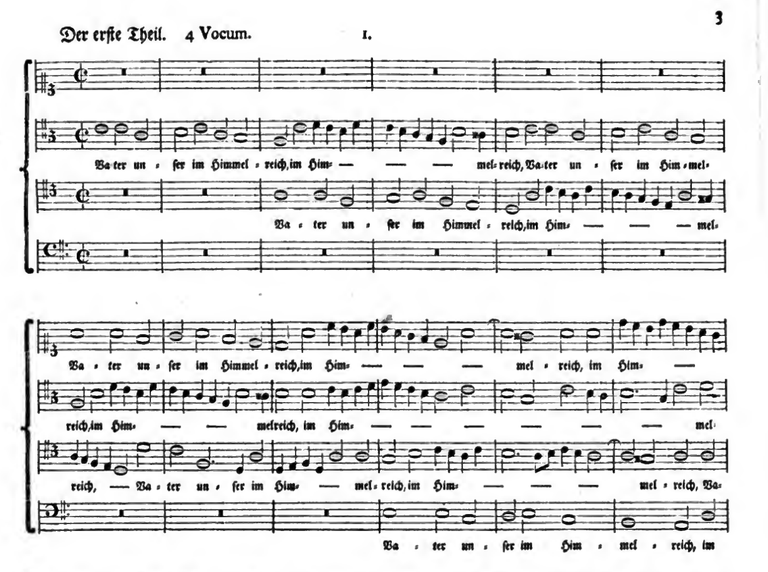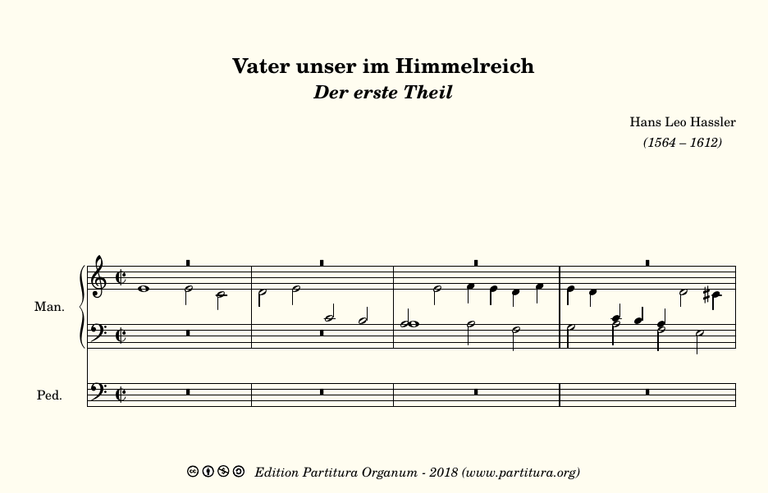Showcase-Sunday | Hans Leo Hassler, Vater unser im Himmelreich (der erste Theil)
#showcase-sunday is an initiative started by @nonameslefttouse where we gather some long buried content to showcase (hopefully) to new sets of eyes. My Steem journey is only one and a half year old. The first year or so I happily posted my stuff for only a few readers. So, I like the change to post some of it again, my own personal favorites.
This post from october 2018 features an adaptation I made of a renaissance choir composition for organ. Though I intended to make more of them, until now that has not happened. Maybe a nice project for somewhere in 2020.
My original post is here: https://steemit.com/classical-music/@partitura/hansleohasslervaterunserimhimmelreichdererstetheil-lhzh5k5lyc
Hans Leo Hassler (1564 - 1612) was a German composer and organist of the late Renaissance and early Baroque eras. He was the son of organist Isaak Hassler and brother of composer Jakob Hassler. Having studied with Andrea Gabriele in Venice, Hassler's style is a fusion of German counterpoint and Italian form. He was a prolific composer and created works of exceptional quality.
In 1608 Hassler published his "Psalmen und christliche Gesänge". This work is a bundle of "choral motets", comprising 52 four-part settings of Lutheran tunes in imitative style. They have each phrase of the chorale melody successively developed in free imitation in each of the four parts.
Though written and intended to be sung, I wondered if these pieces would work when played on the organ. I transcribed the first of these chorale motets, based on the melody of "Vater unser im Himmelreich" for organ. The only adaption I did was to smooth out voice crossings: if the alto voice goes below the tenor voice I let them switch staff. This way it's more easily to play. For the rest this transcription follows note perfected the original. Each phrase of the chorale melody appears (often several times) in each of the four voices. At the same time Hassler pays close attention to the sound and its development the music creates as a whole. The result is a beautiful flowing piece, in which the sound evolves in slow moving arcs.
It's great music and I consider the experiment a success. So in future I'll add another one of these chorale motest every once in a while.
The recording was done on the sample set of the Müller-organ in the Sint Bavokerk in Haarlem by Voxus Organs for Hauptwerk. To emphasize the singing nature of the piece, I use the Praestant 8' of the Bovenwerk, for the bass part coupled to the Bourdon 16' of the Hoofdwerk.
Score
![]() http://partitura.org/index.php/hans-leo-hassler-vater-unser-im-himmelreich-der-erste-theil
http://partitura.org/index.php/hans-leo-hassler-vater-unser-im-himmelreich-der-erste-theil


Posted from my blog with SteemPress : http://partitura.org/index.php/hans-leo-hassler-vater-unser-im-himmelreich-der-erste-theil/
Score available here: http://partitura.org/index.php/david-abel-praeludium-2
Text of original post
The recording was done with the Hauptwerk software and the sample set of the Johann Cyriacus Werner organ Müller-organ in the Pfarrkirchin Strassburg, by Piotr Gabrowsky (http://www.piotrgrabowski.pl/strassburg.html)
Your post has been supported and upvoted from the Classical Music community on Steemit as it appears to be of interest to our community. We also support jazz and folk music posts!
If you enjoy our support of the #classical-music community, please consider a small upvote to help grow the support account!
You can find details about us below.
The classical music community at #classical-music and Discord. Follow our community accounts @classical-music and @classical-radio or follow our curation trail (classical-radio) at SteemAuto!
Delegation links: 10SP, 25SP, 50SP, 75SP, 100SP, 150SP, 200SP, 250SP, 500SP, 1000SP
,